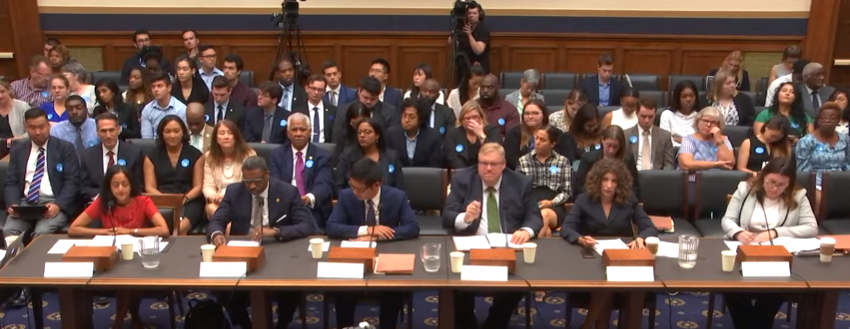U.S. House hears testimony on voter discrimination

The House Judiciary's Subcommittee on the Constitution, Civil Rights, and Civil Liberties heard testimony this week on the impact of the Supreme Court's 2013 gutting of the Voting Rights Act. Those testifying were, from left, Vanita Gupta of the Leadership Conference on Civil and Human Rights, Derrick Johnson of the NAACP, Dale Ho of the ACLU, J. Christian Adams of the Public Interest Legal Foundation, Myrna Perez of the Brennan Center, and Natalie A. Landreth of the Native American Rights Fund. (Image is a still fom this livestream video.)
Since the Democrats took control of the U.S. House last November, their efforts to restore the Voting Rights Act (VRA) — gutted by the U.S. Supreme Court in its 2013 Shelby County v. Holder decision — have continued despite entrenched Republican opposition.
On Sept. 10, the House Judiciary's Subcommittee on the Constitution, Civil Rights, and Civil Liberties once again focused the nation's attention on the VRA with a hearing titled "Evidence of Current and Ongoing Voting Discrimination."
Witnesses included several prominent civil rights leaders: Derrick Johnson, president of the NAACP; Vanita Gupta, president and CEO of the Leadership Conference on Civil and Human Rights; Dale Ho, director of the American Civil Liberties' Voting Rights Project; Myrna Perez, director of the Brennan Center for Justice's Voting Rights and Elections Program, and Natalie A. Landreth, senior staff attorney at the Native American Rights Fund.
Also on the panel was J. Christian Adams, president and general counsel of the conservative Public Interest Legal Foundation and a former member of the Justice Department under the Bush administration. Adams has been known to spread false and exaggerated claims about voter fraud.
The witnesses began by reporting their findings of ongoing voter discrimination at the state and local level.
After the Supreme Court effectively struck down the Section 5 of the VRA that required states and counties with a history of voting discrimination — most of them in the South — to get federal preclearance for election law changes, Republican state lawmakers began promoting restrictive voting laws that explicitly targeted voters of color. Of the 13 Southern states, 11 adopted such laws in Shelby's wake. Among them are states that were covered in whole by the preclearance requirement, including Alabama, Georgia, Mississippi, South Carolina, Texas, and Virginia, as well as those covered in part, such as North Carolina.
"Justice Ruth Bader Ginsburg famously warned about the Supreme Court's decision striking down a part of the voting rights act was like, quote, throwing away your umbrella in a rainstorm, and sure enough, after the decision a downpour came with a wave of discriminatory voting laws," said the ACLU's Ho. Among them were measures that required voter ID, scaled back early voting periods, cut polling locations, restricted absentee ballots, and limited voter registration.
Gupta, who previously led the Obama Justice Department's Civil Rights Division, emphasized the impact of polling place closures on voter turnout. She referenced a report recently released by The Leadership Conference that examined polling places in 750 counties once covered by Section 5. It found that 1,688 polling places were closed between 2012 and 2018, largely in black communities. Polling place closures often lead to long lines, voter confusion, and transportation challenges.
"Without preclearance, states are under no obligation to evaluate the discriminatory impacts and potential harms of polling place closures," said Gupta.
The NAACP's Johnson pointed out that without preclearance and a responsive Justice Department the burden of combating voting discrimination has fallen on legal organizations and voting rights activists. "Our branches and members are asked to do what used to be the job of the federal government — protect the right to vote," he said. "To be clear, we're fighting back wherever and whenever we can. This is not sustainable. Congress must step up to combat this nation's epidemic."
Noting that prior to Shelby jurisdictions had to clear changes to their purge practices with the Justice Department, the Brennan Center's Perez reported that almost 16 million people were removed from the voting rolls between 2014 and 2016. "It's difficult to address the effects of bad purges until it is too late," she said. "That's why Section 5's preclearance process is well tailored to address not only voter discrimination and other forms but the purge problem specifically"
Landreth focused on how losing preclearance protections has affected Native American voters. In the first election after Shelby in formerly preclearance-covered Arizona, for example, Maricopa County reduced the number of polling places from hundreds down to about 60 in 2016, resulting in voters standing in line for as long as six hours to cast a ballot. The voters were forced to sue to get polling places reopened.
"Why do these voters have to sue to not wait in a four- to six-hour line?" asked Landreth. "Because preclearance is gone."
Besides detailing problems, the hearing also considered solutions — and all of the witnesses agreed that restoring Section 5 of the VRA was critical. There are currently several bills in Congress that would restore the VRA, all of them stalled in the legislative process because of inaction by Republican leaders.
"Make no mistake — Congress has ample evidence [of the need] to restore the Voting Rights Act to its full strength," said Johnson. "No one can deny the strong record that supports immediate passage."
Tags
Benjamin Barber
Benjamin Barber is the democracy program coordinator at the Institute for Southern Studies.
